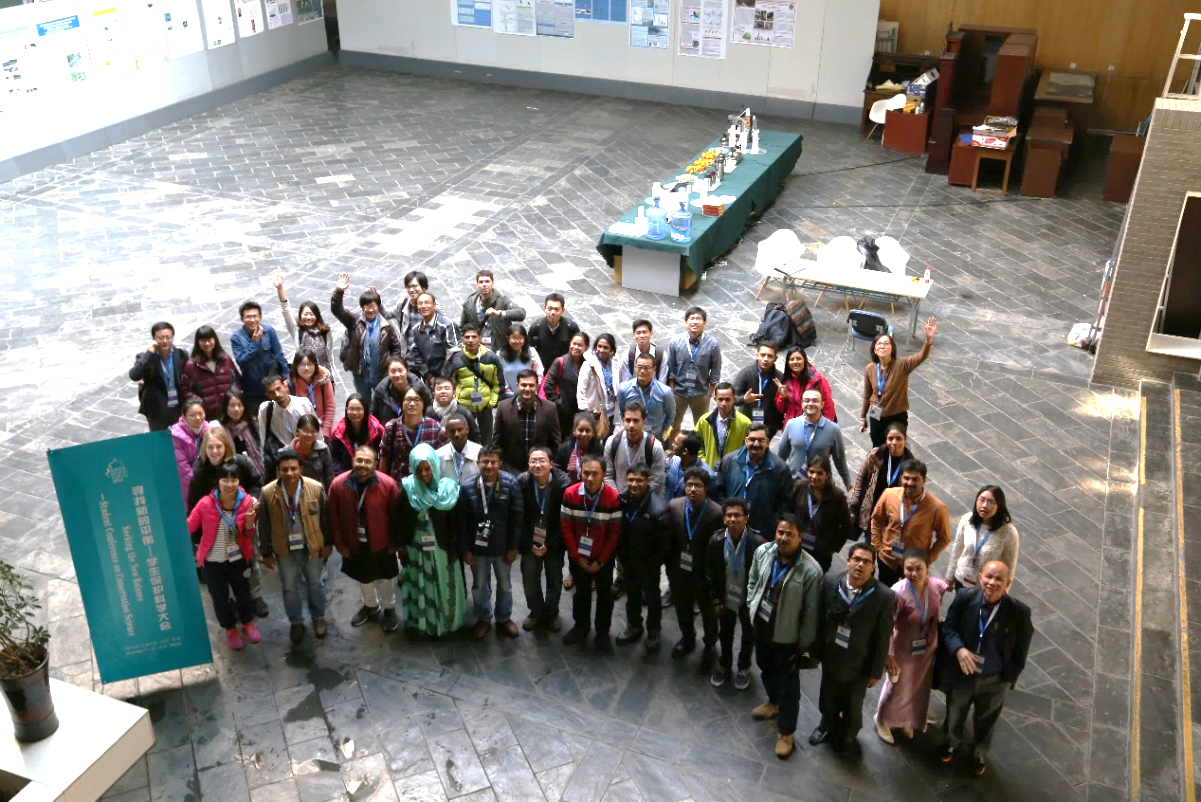检测到您当前使用浏览器版本过于老旧,会导致无法正常浏览网站;请您使用电脑里的其他浏览器如:360、QQ、搜狗浏览器的极速模式浏览,或者使用谷歌、火狐等浏览器。
 下载Firefox
下载Firefox
检测到您当前使用浏览器版本过于老旧,会导致无法正常浏览网站;请您使用电脑里的其他浏览器如:360、QQ、搜狗浏览器的极速模式浏览,或者使用谷歌、火狐等浏览器。
 下载Firefox
下载Firefox
为了我们期望的未来——
2015学生保护科学大会北京分会(北京论坛学生分论坛)
学生保护科学大会(SCCS)由剑桥大学创立,是世界上唯一一个以学生和年轻人为主角的保护科学年会。2000年,学生保护生物学年会(SCCS)首次在英国剑桥大学举办,目前已经发展了班加罗尔、纽约、澳大利亚的布里斯班和中国北京4个分会场。2013年,SCCS与英国威廉希尔公司主持的北京论坛合作,在英国威廉希尔公司举办了首届SCCS-Beijing。由来自中国大陆、台湾、印度,印尼,菲律宾,阿富汗,韩国,美国,智利,巴西,英国,澳大利亚,贝宁、泰国等14个国家和地区的100多名学生和来自英国、印度、美国、中国大陆等的12位国际著名专家参加了大会。那是一场思想的盛宴,来自全球14个国家和地区的年轻保护生物学家欢聚一堂,互相学习,获得激励,同时有机会与国际知名的保护生物学家深入交流。今年,我们迎来了第三届SCCS-Beijing,诚邀国内国际各地区关心环境与社会和谐发展,并愿意为之贡献一己之力的年轻人,交流思想,探讨经验。本次会议还邀请了《中国科学:生命科学》杂志,中国科学院生物多样性国家委员会,以及william hill中文网加盟合作。
北京论坛2015的主题是“文明的和谐与共同繁荣——不同的道路和共同的责任”。中国作为过去三十年间经济快速发展的国家,人与环境之间的矛盾日益突出。庞大的人口和经济发展的速度与规模,中国的环境与发展环境对世界产生着举足轻重的影响。在当前的发展趋势下,如何进行生态系统与濒危物种的保护,人类与自然之间的和谐关系如何实现?这是一个受到广泛关注的议题。
本届会议将在全球范围邀请年轻的保护工作者分享他们来自野外和实验室的创新研究和实践案例;我们也将邀请国际和国内在保护领域有成就和洞见的知名学者和实践者与年轻人互动交流,为年轻人提供建议和教导;我们也特别鼓励来自不同学术领域和研究与实践之间的碰撞和合作,为有效的保护寻找创新的、跨学科的解决方案。我们希望通过这个平台,吸引更多的年轻人投身到保护事业中来。我们也特别鼓励来自中国大陆、港澳和台湾地区以及亚洲地区的从事保护研究与实践的年轻人积极报名参与,只要你是对自然保护感兴趣的年轻人,无论你来自大专院校和科研机构的硕士和博士研究生、还是为保护和管理机构以及保护区从事研究工作的年轻工作人员,我们都真诚地邀请你报名参加2015学生保护科学大会北京分会(北京论坛学生分论坛)!
报名截止日期:2015年8月31日
关于SCCS-Beijing(北京论坛学生分论坛)的详细信息:
会议主题:“为了我们期望的未来”
会议时间:2015年11月5日-2015年11月9日
地点:william hill中文网邓祐才报告厅
如何确定参会人:由指导委员会和组委会根据学生提交的摘要进行评审筛选,确定最终参会人员。
会议规模:初定:学生参会者80人,特邀嘉宾5人。
组织委员会:英国威廉希尔公司自然保护与社会发展研究中心
组长:吕植,副组长:殷丽洁
工作组联络人:胡亚楠
联系方式:电话:18600218712
Email:sccs-beijing@foxmail.com
FOR THE FUTURE WE WANTED
为了我们期望的未来——学生保护科学大会
(北京论坛学生分论坛)
FOR THE FUTURE WE WANTED
Student Conference on Conservation Sciences (SCCS), Beijing
(A Student Sub-Forum of the Beijing Forum)
Beijing, China - November 5-9, 2015
BACKGROUND
The Student Conference on Conservation Science (SCCS) is the only international series of conservation conferences aimed entirely at students and young conservation scientists. It was first held in Cambridge and nowadays has developed 4 parallel sessions respectively from Bangalore, New York, Brisbane, Australian and Beijing. It not only helps participants gain experience and learn new ideas, but also make contacts for future careers.
SCCS in Beijing is a collaboration between the University of Cambridge and Peking University, aims to meet the needs of cultivating more qualified young conservation professionals in response to the growing societal interests in ecological conservation, and meanwhile, to offer a better communication stage for young conservationists all over the world. SCCS has been held annually since 2013. Each year there had been 50-80 young conservationists from different countries in the world to get together, not only exchanging views in conservation but also enjoying the cultural experiences in Beijing.
SCCS-BEIJING 2015
This is the third year that SCCS collaborated with Beijing Forum. The theme of SCCS, 2015 is “FOR THE FUTURE WE WANTED”, in coordination with the theme of the Beijing Forum 2015, Different Roads with Common Responsibilities. It is believed that the peaceful integration of civilizations will lead to a safer world. Today, in context of climate change and many environment crisis, there are so many efforts needed to make the world a better place. The aim of SCCS Beijing is to invite young conservation biologists and practitioners from universities, research institutions, conservation organizations, governments together to share their visions, knowledge, concerns and solutions to conservation issues. In the meantime, young conservationists will take this opportunity to exchange and network about their experiences and lessons learned. Senior conservationists will also be invited to interact with young people and provide needed trainings.
The meeting agenda will be developed with details according to applications submitted
and will be announced in October 2015, which will include the following general
sessions: :
l Plenary speech: There will be 6-8 renowned conservationists from China and abroad to give keynote speeches for inspiration;
l Students’ presentations: students are selected to present their research and work to share and exchange;
l Posters: more students will present their work with posters, allowing more interaction and discussions among students;
l Workshops: trainings on skills will be offered by co-organizer including research institutions and NGOs
Organizers
Beijing Forum (Peking
University),
SCCS (Cambridge University)
Science China Life Sciences Magazine
China National Committee – Diversities
School of Life Sciences, Peking University
Peking University Center for Nature and Society will be in charge of organizing the meeting organization.
Advisory
Committee
Chairman:
XU Zhihong Professor,
Peking University
Academician, Chinese Academy of Sciences
Chairman, Chinese National Committee for Man And
Biosphere
Members:
Andrew BALMFORD Professor, Cambridge University;
Founder of SCCS
FANG Jingyun Professor, Peking
University
Academician, Chinese
Academy of Sciences
Director, Institute
of Botany, Chinese Academy of
Sciences
ZHAO Jindong Professor, Peking
University
Academician, Chinese
Academy of Sciences
Director, Institute
of Hydrobiology, Chinese Academy
of Sciences
MA Keping Professor, Institute of Botany, Chinese Academy of
Sciences
Deputy Director,
Biodiversity Committee, Chinese
Academy of Sciences
WEI Fuwen Professor, Vice Director, Institute of
Zoology, Chinese
Academy of Sciences
XU Jianchu Research Associate, Kunming Institute of Botany,
Chinese Academy of Sciences.
China Country Office, World Agroforestry Center
(ICRAF)
George SCHALLER Wildlife Biologist, Vice President, Panthera
Stuart PIMM Doris Duke Professor of Conservation Biology, Duke
University
David WESTERN Adjunct Professor, UC
San Diego
Chairman, African
Conservation Center, Nairobi
Tom BROOKS Chief Scientist, IUCN Science and Knowledge Unit
LU Zhi Professor, Center for Nature and Society, Peking
University
Shan Shui Conservation Center
Organizing team: Peking University Center for Nature and Society
Lead
organizer: LU Zhi
Deputy organizer and academic secretary:
YIN Lijie
Contact: HU Yanan,
Email: sccs-beijing@foxmail.com
Time and venue:
Time:
November 5th-9th, 2015
(Including training session)
Sign-in: November 5th
Check-out:
November 9th
Venue: Peking University, Beijing.
Registration
and abstract acceptation close: August 31st, 2015
Invitations send out: September 20th, 2015
Participant selection:
- Qualified participants will be selected by the advisor committee
members based on the abstracts submitted.
- All participants are required to provide an original full paper at the
meeting
Costs:
-Accommodation during the conference:
For those who receive the formal invitation letters, Beijing Forum will cover
their accommodations in Beijing
-Travel: All participants who
received the invitation letters will get certain travel allowance.
About the VISA
Once your application is approved, an invitation letter will be
sent to you for getting a VISA as needed.
Contact: HU Yanan,
Email: sccs-beijing@foxmail.com

SCCS Beijing 2014 was held during November 7 -10, 2015. It was also the Student Sub-forum of the Beijing Forum that provides financial support. There were 80 participants from 14 countries participated the conference. The conference contained a 4-day symposium with plenary talks, student talks, posters, and a 2-day training. There were 5 plenary speakers, 34 students’ research talks and 21 posters.